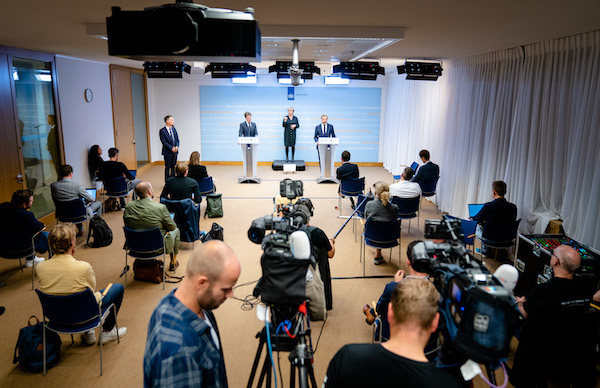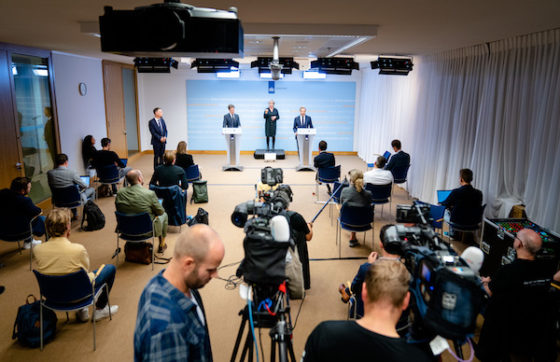Dutch lift social distancing, target non-vaccinated at work


The Netherlands is dropping social distancing as a requirement from September 25 but is also looking into giving employers more powers to determine if their workforce has been vaccinated, Dutch health minister Hugo de Jonge told reporters on Tuesday evening.
Most of the changes which will come into effect later this month have already been leaked but the government cannot go as far as hoped because there are still too many new cases and hospital admissions, prime minister Mark Rutte told reporters.
In order to drop the 1.5 metres rule, the government’s Outbreak Management Team has recommended introducing the coronavirus pass for café, theatre and cinema visitors. Clubs and cafes will remain closed between midnight and 6pm and the government is looking at extending financial support to help companies which are impacted by this decision, Rutte said.
The coronavirus pass is a QR code which can be shown on a mobile phone or printed paper and which indicates if the bearer is either fully vaccinated, has recently had coronavirus or has a negative coronavirus test, no older than 24 hours.
Coronavirus in the Netherlands: what you need to know
As yet, tests will be free and the government will provide extra cash for local authorities to check that bars are making sure that their customers have a valid coronavirus pass. The aim, Rutte said, is to make sure that as many people as possible can go out and have a social life.
The 1.5 metre rule is a symbol of all the restrictions we have imposed upon each other over the past months, De Jonge said. ‘Coronavirus will remain with us and we will have to learn to live with it,’ he said.
Protection
The primary aim of the coronavirus pass is to stop the virus spreading too quickly and to protect the healthcare service. It will also help protect people who are not vaccinated because the vaccine does not take, or for other health reasons, he said.
De Jonge had harsh words for people who are not vaccinated by choice. ‘Let us be clear about this, choices have consequences,’ he said. ‘Freedom is never without boundaries. The freedom of a small group which has not been vaccinated impinges on the freedom of the big group which has done,’ he said. ‘The price of that freedom may mean restricted access to the healthcare system for people who need other types of treatment.’
Some 1.8 million people in the Netherlands are not yet vaccinated.
Employers, he said, have asked about the option of introducing the coronavirus pass at work. In current law, employees are not required to answer if asked whether or not they are vaccinated. At the same time, employers are required to provide a safe working environment for their workers.
Unions and employers
De Jonge said he is now in talks with both unions and employers organisations to see what the options are. ‘No decision has been taken and it is right that we look at the situation,’ he said. This is a particularly acute question in the healthcare sector, he said.
The government will decide on November 1 if the remaining rules should be abandoned or not.
Journalists and officials attending the press conference were not able to leave the building until 9.30pm because of a noisy protest by demonstrators outside. The protest was clearly audible during the press conference at times.
Thank you for donating to DutchNews.nl.
We could not provide the Dutch News service, and keep it free of charge, without the generous support of our readers. Your donations allow us to report on issues you tell us matter, and provide you with a summary of the most important Dutch news each day.
Make a donation